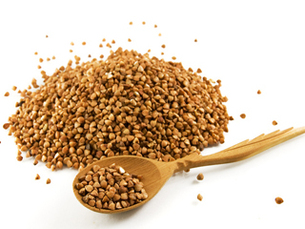
Buckwheat
The idea of preparing meals with buckwheat is anything but new to me. I grew up eating buckwheat pretty much on a daily basis. Did I get tired of it? At times! But now I am really happy because I was accustomed to it from an early age. In the Soviet Union, if people didn't have much food there was always buckwheat. No matter where you went you didn't have to go far to find it. Not long after moving to California, I got home sick, and the first thing I wanted to have was buckwheat. A simple thing turned out to be a mission. I realized that it's not a common food in US. I ended up finding it at Whole Foods but it was definitely a cultural experience having to look hard for buckwheat. So what is so good about buckwheat?
Buckwheat originated in the mountainous areas of India and Nepal, where it's unique biochemical composition has benefited it's people for over 4000 years. In the 15th century (BC), due to the undemanding growing conditions of buckwheat, it's cultivation spread to Japan, China and Korea, and a little later - the countries of Central Asia, the Caucasus and the Middle East.
Today, Russia grows about half of the global harvest of buckwheat and for many years it has been the world's main consumer of this useful plant.
Despite its name, buckwheat has nothing to do with wheat. It is not a cereal grain at all. It’s the seed of the fagopyrum plant, which is in the same family as sorrel and rhubarb. It does not contain gluten. So referring to buckwheat as a seed than a grain would be more appropriate.
Buckwheat provides numerous nutritional benefits. It is a great source of vitamins B1 and B2. Rutin, which can be found in buckwheat, is actively prescribed for high blood pressure, rheumatism and other diseases. Rutin also has antioxidant activities and able to fight against free radicals in your body. Buckwheat is also rich in various minerals, such as magnesium, calcium, phosphorus, copper, zinc and bromine. Most of all, it is a great source of iron, so it is recommended for people suffering from anemia. Researchers have discovered that if you eat buckwheat with fruits, the absorption of iron in our bodies will increase. Buckwheat is full of dietary fiber which helps relieve constipation. Buckwheat is a good source of protein. The complete protein in buckwheat has 8 essential amino acids which are not produced by the body.
In short, Buckwheat should be a staple in all of our diets.... Please share any recipes you may have which include Buckwheat.
Buckwheat originated in the mountainous areas of India and Nepal, where it's unique biochemical composition has benefited it's people for over 4000 years. In the 15th century (BC), due to the undemanding growing conditions of buckwheat, it's cultivation spread to Japan, China and Korea, and a little later - the countries of Central Asia, the Caucasus and the Middle East.
Today, Russia grows about half of the global harvest of buckwheat and for many years it has been the world's main consumer of this useful plant.
Despite its name, buckwheat has nothing to do with wheat. It is not a cereal grain at all. It’s the seed of the fagopyrum plant, which is in the same family as sorrel and rhubarb. It does not contain gluten. So referring to buckwheat as a seed than a grain would be more appropriate.
Buckwheat provides numerous nutritional benefits. It is a great source of vitamins B1 and B2. Rutin, which can be found in buckwheat, is actively prescribed for high blood pressure, rheumatism and other diseases. Rutin also has antioxidant activities and able to fight against free radicals in your body. Buckwheat is also rich in various minerals, such as magnesium, calcium, phosphorus, copper, zinc and bromine. Most of all, it is a great source of iron, so it is recommended for people suffering from anemia. Researchers have discovered that if you eat buckwheat with fruits, the absorption of iron in our bodies will increase. Buckwheat is full of dietary fiber which helps relieve constipation. Buckwheat is a good source of protein. The complete protein in buckwheat has 8 essential amino acids which are not produced by the body.
In short, Buckwheat should be a staple in all of our diets.... Please share any recipes you may have which include Buckwheat.
